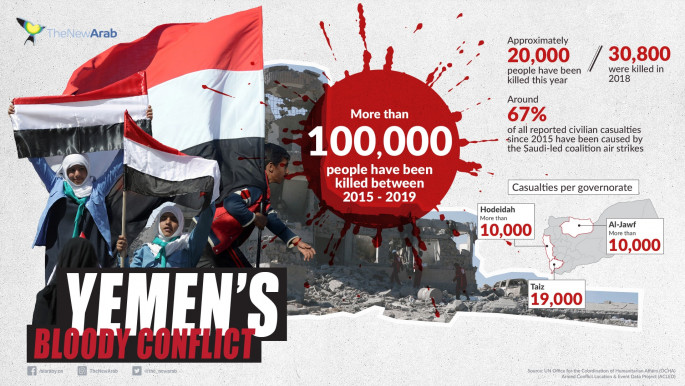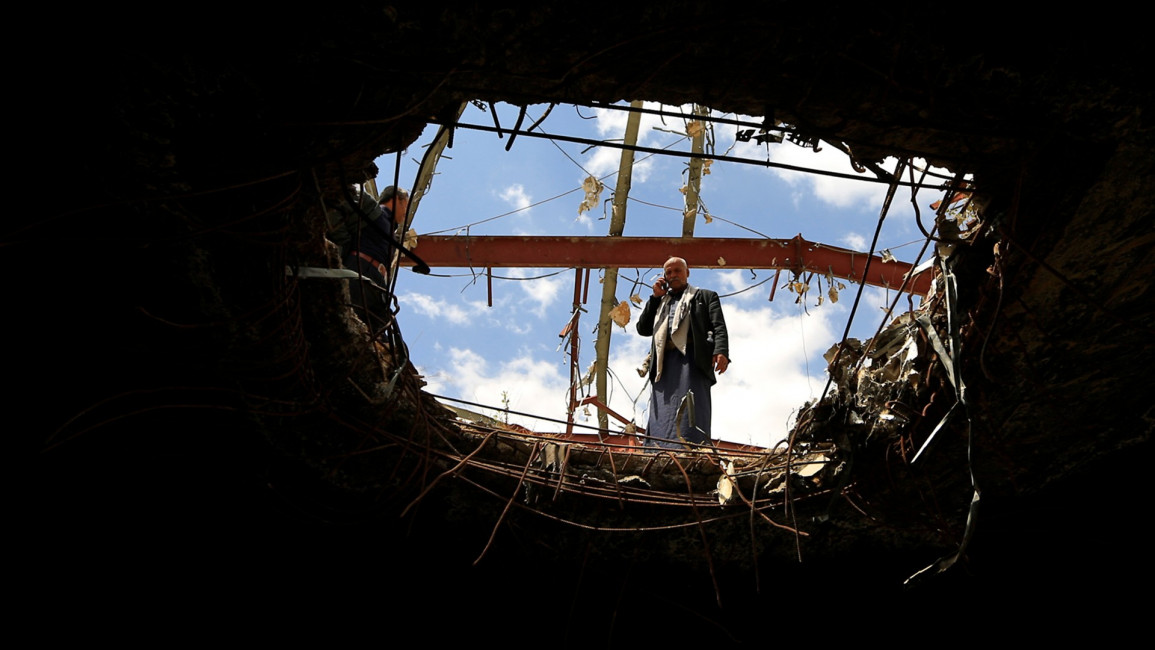Saudi-led coalition retaliation raids strike rebel depots in Sanaa
Turki al-Maliki, spokesman for the coalition fighting alongside Yemen's internationally-recognised government, said the strikes were in retaliation for ballistic missiles attacks on "civilian targets" in Saudi Arabia.
The coalition "carried out a unique military operation to destroy legitimate military targets for the capabilities of assembling and firing of Iranian ballistic missiles and drones in the capital Sanaa", he said, quoted by the Saudi state news agency SPA.
He said Sanaa had become "a Houthi militia assembly, installation and launching hub for ballistic missiles that target the kingdom".
The attacks destroyed storage, assembly and firing sites in the districts of Faj Atan, Al-Amad Camp and Al-Nahdain mountain, he said.
On Friday, Riyadh said it intercepted ballistic missiles fired by the Houthis in a "systematic, deliberate manner to target cities and civilians", in what it branded a breach of international law.
A Houthi spokesman said the group had targeted oil installations in the kingdom with a dozen Sammad-3 drones and ballistic missiles.
Read also: Yemen in Focus: Saudi forces target tribal fighters as Houthis reveal advanced anti-air capabilities
Saudi Arabia has repeatedly accused Iran of supplying sophisticated weapons to the Houthis, a charge Tehran denies.
The US last week also accused Tehran of delivering weapons to the rebels, citing arms it said it had intercepted, days after the Houthis claimed to have downed a Saudi fighter with an "advanced surface-to-air missile".
The comments came following a second interception in less than three months of what Washington claimed were Iranian arms destined for the Tehran-backed rebels.
Twitter Post
|
"The seizure is consistent with a historical pattern of Iranian smuggling of advanced weapons to the Houthis in Yemen," said Captain Bill Urban of US Central Command, which is responsible for US forces in the Middle East, during a briefing at the Pentagon on the latest interdiction.
That followed a report released earlier this month suggesting drones used by the Houthis are becoming deadlier and more accurate over long ranges.
The interceptions were in the Gulf region and involved dhow vessels that were sailing without a flag, the first occurring on 25 November and the second on 9 February.
Photos of the seized cargo and said the weapons came from Iran and were intended for the Houthis.
In the latest seizure, the USS Normandy found 150 "Dhelavieh", Iranian-made copies of the Russian Kornet anti-tank guided missile and three Iranian-designed and manufactured "358" surface-to-air missiles, he said.
The weapons seized in November included the same type of projectiles plus a large number of spare parts for cruise missiles.
The United States assessed "with high confidence" that the weapons "were being illicitly smuggled to the Houthis in Yemen in contravention of multiple UN Security Council Resolutions," Urban said.
Since the coalition intervened to back the government in March 2015 after the rebels seized Sanaa, the conflict has killed tens of thousands of people in impoverished Yemen, many of them civilians.
The fighting has triggered what the United Nations describes as the world's worst humanitarian crisis, with millions displaced and in need of aid.
The coalition force has been widely criticised for the high civilian death toll from its aerial campaign, which has prompted some Western governments to cut arms deliveries to the countries taking part.
Last week, thirty-one people were killed in air strikes on Yemen, the United Nations said, the victims of an apparent Saudi-led retaliation after Houthi rebels claimed to have shot down one of its jets.
The Saudi-led coalition fighting Houthi rebels earlier this week said it would put on trial military personnel suspected of being behind deadly air strikes on civilians in Yemen, where the UN has deplored horrific rights violations.
Wednesday's announcement by coalition spokesman Turki al-Maliki is the first of its kind since the coalition, which still includes the United Arab Emirates despite its recent drawdown of its forces, first intervened in Yemen.
The cases being investigated include a 2018 air strike on a school bus in the northern region of Dahyan that killed at least 40 children, Saudi-based Arab News said.
They also include a raid on a wedding party the same year in the Houthi-controlled Bani Qais area of Hajja province, which left 20 dead, and the 2016 deadly bombing of a hospital supported by Doctors Without Borders (MSF), in which 19 people were killed.

Follow us on Facebook, Twitter and Instagram to stay connected



